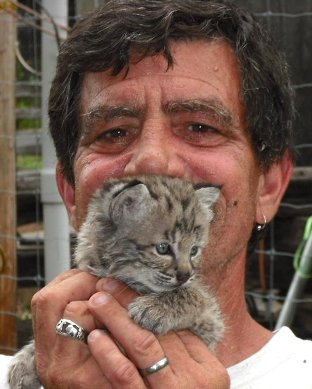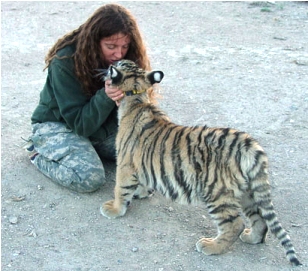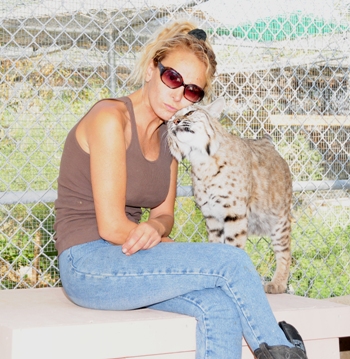
Animal Welfare - A Human Rights Concern
By Raven Simons, Fall 2010
When considering the topic of human rights people often think of issues
like gender equality, fair access for humans to all resources, health care
for all, racial equality, non-exploitation of humans, and fair and kind
treatment for all people.

I don't recall ever hearing or reading about animal welfare being included in the issue of "human" rights. Why am I bringing this topic up? When you think about it, the way we treat animals has a lot to do with the way we treat each other.
It has been discovered that children who torment and mistreat animals often
grow up to abuse humans. Individuals who are violent to their family members
are often cruel to their pets and use the threat of violence against the
family pets as a way to coerce the abused. People who hoard animals are now
known to suffer from mental illness and may impact society in a negative
way. The inability to be empathetic to animals is often a sign of someone
who is unable to have positive feelings for other people and may even be
signs of someone with sociopathic tendencies. We, as humans, should be very
concerned with how we treat animals and view this as part of our concern for
humanity.
The ability of people to treat all animals with kindness and be concerned
with the way animals are treated can be a vital lesson in how to be
connected with others. When we feel true connection to others we are less
likely to cause harm to them. Depersonalization and stereotyping has been
proven to help people behave in a criminal manner. If we empathize with
others it becomes harder to hurt them. There are many people who start the
process of empathy by feeling connected to a beloved pet.
 Children in particular can be taught kindness, caring, and compassion by
sharing their lives with a pet. Many advocates for animal welfare trace
their passion back to a childhood companion. Some also remember family
values that emphasized the welfare of this animal. Positive pet ownership
encourages healthier human relationships, a feeling of connection to the
natural world, and respect. On the other hand children who are raised
isolated from non-human animals can grow up to lack any empathy or caring
for any animal besides humans. Sometimes this lack of caring extends to all
of the natural world and has been come to be called "nature deficit
disorder".
Children in particular can be taught kindness, caring, and compassion by
sharing their lives with a pet. Many advocates for animal welfare trace
their passion back to a childhood companion. Some also remember family
values that emphasized the welfare of this animal. Positive pet ownership
encourages healthier human relationships, a feeling of connection to the
natural world, and respect. On the other hand children who are raised
isolated from non-human animals can grow up to lack any empathy or caring
for any animal besides humans. Sometimes this lack of caring extends to all
of the natural world and has been come to be called "nature deficit
disorder".
Kindness to animals is a positive asset to humans. Sadly the animal rights
movement has confused positive human/animal relationships and animal welfare
with animal abuse. It is important to realize that there is a difference
between animal "welfare" and animal "rights". The founders and leaders of
the animal "rights" movement see human/animal relationships as ultimately
detrimental to animals.

They would like all animals to be wild and free, for
people to quit eating meat, and stop owning pets. Considering the growth of
human population, pressures on the natural world, and indicators that people
who do not have good relationships with animals can have very real problems,
I am puzzled by the animal "rights" agenda. Animal "welfare" is the very
concern for treating animals kindly, with respect, and seeing that animal
needs and care are being met.
I am a pet owner. One of the types of pets I personally own are cats. My
children were raised with pets and have gone on to raise their own children
with pets. My extended family love animals and nature and share a respect
for all life. They treat other people well. I believe this behavior to be
directly related to their having grown up with pets and having me
demonstrate caring and good treatment of all animals.
Over the years I have had visitors in my home that have marveled at the
personalities of my pets, especially my felines. People who have not been
raised with cats in the home have many strange ideas about what a cat's
personality is like. I have heard comments like, "Wow, I didn't know cats
could be so friendly", and "I didn't know that cats had so much
personality". Dog lovers are especially surprised. Of course, people who are
totally unfamiliar with living with animals are amazed at all of my pets.
 I have Bengal and Savannah cats and I have encountered more than one visitor
who has never seen such a creature. I've been asked, "Is that a wild
animal?" and "Does it bite?" When they see how friendly these cats are and
their curiosity is satisfied they are always impressed. To me these folks
show their unfamiliarity with the natural world and the concepts of domestic
vs. wild. What this also demonstrates is that pets can help people connect.
When they meet an animal ambassador they can feel a connection and positive
feelings for another creature which is related to their feelings of
connection to humans.
I have Bengal and Savannah cats and I have encountered more than one visitor
who has never seen such a creature. I've been asked, "Is that a wild
animal?" and "Does it bite?" When they see how friendly these cats are and
their curiosity is satisfied they are always impressed. To me these folks
show their unfamiliarity with the natural world and the concepts of domestic
vs. wild. What this also demonstrates is that pets can help people connect.
When they meet an animal ambassador they can feel a connection and positive
feelings for another creature which is related to their feelings of
connection to humans.
When issues are viewed as human rights a different 'more important to
people' emphasis is usually given to the particular issue being examined.
With the correlations between a human's ability to be kind to, care about,
and be concerned with the welfare of animals and the same ability applied to
humans, one might see the importance of including positive human/animal
relationships within the umbrella of human rights. This makes animal welfare
a human rights concern.
Raven Simons is a professional member of the Cat
Writer's Association. The article was first published in 'Bengals
Illustrated' in the July, August, September 2010 issue, Vol.4 No. 3'
Photo Copyright © 2010 REXANO, Deanna Croassmun, Kathy Baird and Kurt Beckelman
Content copyright © 2010 by
Raven Simons. All rights reserved.
www.REXANO.org